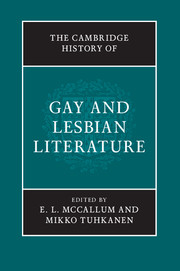Book contents
- The Cambridge History of Gay and Lesbian Literature
- The Cambridge History of Gay and Lesbian Literature
- Copyright page
- Contents
- Contributors
- Acknowledgments
- Introduction
- Part I Reading Ancient and Classical Cultures
- 1 The Sappho Tradition
- 2 Plato and the Philosophical Dialogue
- 3 The Pastoral Lament in Ancient Greek and Latin
- 4 Roman Prose and Poetry
- 5 Configurations of Gender and Sexuality in Medieval Europe
- 6 Male-Male Love in Classical Arabic Poetry
- 7 China: Ancient to Modern
- Part II Renaissance and Early Modern
- Part III Enlightenment Cultures
- Part IV Queer Modernisms
- Part V Geographies of Same-Sex Desire in the Modern World
- Part VI Genres of the Present
- Index
2 - Plato and the Philosophical Dialogue
from Part I - Reading Ancient and Classical Cultures
Published online by Cambridge University Press: 18 December 2014
- The Cambridge History of Gay and Lesbian Literature
- The Cambridge History of Gay and Lesbian Literature
- Copyright page
- Contents
- Contributors
- Acknowledgments
- Introduction
- Part I Reading Ancient and Classical Cultures
- 1 The Sappho Tradition
- 2 Plato and the Philosophical Dialogue
- 3 The Pastoral Lament in Ancient Greek and Latin
- 4 Roman Prose and Poetry
- 5 Configurations of Gender and Sexuality in Medieval Europe
- 6 Male-Male Love in Classical Arabic Poetry
- 7 China: Ancient to Modern
- Part II Renaissance and Early Modern
- Part III Enlightenment Cultures
- Part IV Queer Modernisms
- Part V Geographies of Same-Sex Desire in the Modern World
- Part VI Genres of the Present
- Index
Summary
- Type
- Chapter
- Information
- The Cambridge History of Gay and Lesbian Literature , pp. 34 - 50Publisher: Cambridge University PressPrint publication year: 2014



